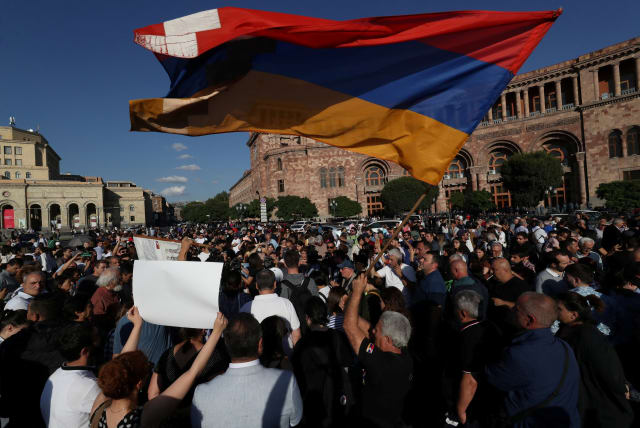Armenia, recognizing Palestine as a state is not a good way to bring peace - editorial

Armenia’s decision to recognize Palestine as a state could be viewed as reflective of the underlying antisemitic sentiments within these segments of Armenian society.
Armenia unilaterally recognized Palestine as a state on Friday, becoming the ninth country since April to do so as a direct response to the Gaza war. There are several factors that make this decision particularly more interesting than other countries.
The Armenian Foreign Ministry noted that “the catastrophic humanitarian situation in Gaza and the ongoing military conflict are among the primary issues on the international political agenda that require settlement.”
Hamas welcomed the move, writing that it “considers it an additional and important step towards solidifying the international recognition of our people’s rights and their aspirations to end the Nazi Zionist [Israeli] occupation of their land and establish their fully sovereign independent state with Jerusalem as its capital. We reiterate our call to... the world to take similar steps in support of our people’s struggle against the occupation and to isolate the criminal Zionist entity that continues to commit the genocide crime and ethnic cleansing.”
Ties between both nations, despite existing since Armenia’s independence from the Soviet Union, have cooled noticeably since the 2020 Nagorno-Karabakh conflict between Armenia and Azerbaijan. In a Post interview, Armenia’s ambassador to Israel, Arman Akopian, said Azerbaijan has been using Israeli weapons to maintain its power over Nagorno-Karabakh.
Notably, political ties between Armenia and Iran are growing increasingly robust, extending beyond typical neighbourly relations. Recently, Iranian media reported that Armenia plans to construct a new highway connecting to Iran. Additionally, Armenia has signed an arms deal with India, stipulating that the arms will be transported to Armenia through Iran. In 2023, reports surfaced indicating the presence of Iranian soldiers in Armenia, positioned along its border with Azerbaijan, and the Islamic Republic has also been accused of using Armenia as a transport hub for suicide drones it is transferring to Russia for use in the Ukraine war.
Such activities make Armenia a questionable bedfellow for Israel.
And then there is the antisemitism. According to the ADL’s 2014 Global 100 report, 1.3 million Armenians, out of a then-population of 2.2 million harbored antisemitism attitudes. A staggering 59% of the population.
On New Year’s Day, the capital Yerevan was host to a serious incident when a group of neo-Nazis paraded down the streets with flags displaying stylized swastikas.
The movement in question is the Husnak movement, a nationalist movement whose website praises Hitler and contains antisemitic caricatures and articles calling for the deportation of Jews, and for the “exposure of their activities towards children.”
Since October 7, Mordechai Nawi Synagogue, Yerevan’s only synagogue, has been attacked multiple times, including last week. Diaspora Affairs Minister Amichai Chikli responded that, “We view these grave antisemitic incidents in Yerevan, Armenia, most seriously.
“Since the arms deal between Israel and Azerbaijan, antisemitic attacks in Armenia have become more evident. There has been increased desecration of Jewish symbols, like the desecration of the monument in memory of victims of the Holocaust, and the attack on the synagogue.”
What does Armenia's choice mean?
Armenia’s decision to recognize Palestine as a state could be viewed as reflective of the underlying antisemitic sentiments within these segments of Armenian society, suggesting a political alignment that contrasts with the interests of Israel and the Jewish community in the Diaspora.
“The Republic of Armenia has joined the resolutions of the UN General Assembly calling for an immediate ceasefire in Gaza,” the Armenian Foreign Ministry statement continued, after the statehood announcement.
“Furthermore, the Republic of Armenia is genuinely committed to establishing peace and stability in the Middle East and lasting reconciliation between the Jewish and Palestinian peoples.”
If the Armenians are as genuinely committed to establishing peace and stability as they state, maintaining such close ties with Iran, and rewarding Hamas, a terrorist organization with statehood as a prize for kidnapping innocent Israeli men, women, and children from their homes, is not the way to go about it.
Jerusalem Post Store
`; document.getElementById("linkPremium").innerHTML = cont; var divWithLink = document.getElementById("premium-link"); if (divWithLink !== null && divWithLink !== 'undefined') { divWithLink.style.border = "solid 1px #cb0f3e"; divWithLink.style.textAlign = "center"; divWithLink.style.marginBottom = "15px"; divWithLink.style.marginTop = "15px"; divWithLink.style.width = "100%"; divWithLink.style.backgroundColor = "#122952"; divWithLink.style.color = "#ffffff"; divWithLink.style.lineHeight = "1.5"; } } (function (v, i) { });

